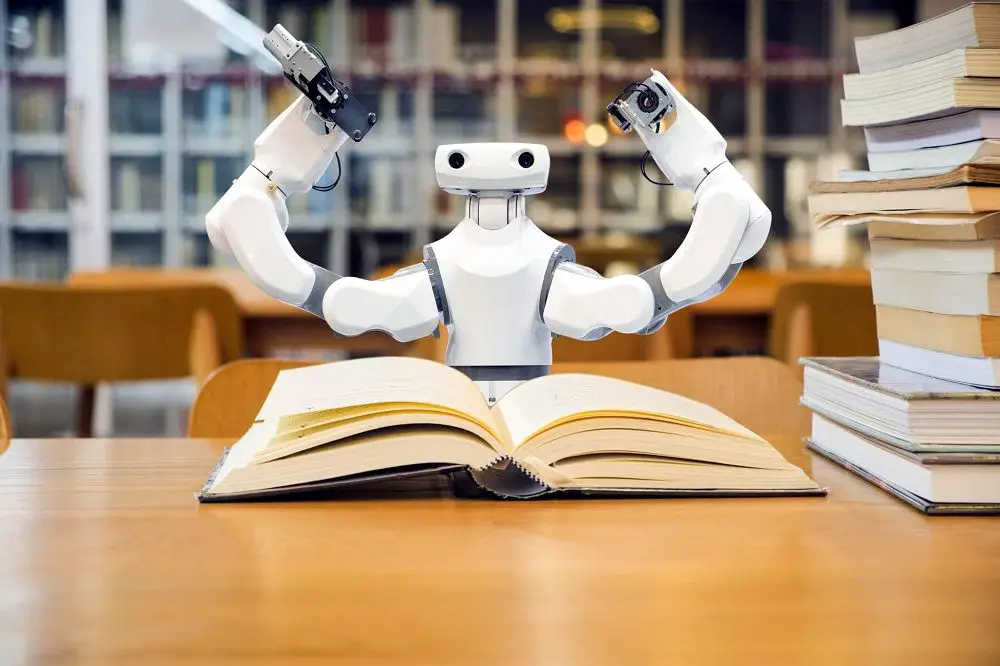Ai And The Future Of Libraries And Information Science

Executive Summary

The integration of Artificial Intelligence (AI) into libraries and information science is revolutionizing the way information is accessed, managed, and disseminated. Libraries are rapidly adopting AI technologies to enhance their services, improve efficiency, and create new opportunities for patrons and staff alike. This article explores the profound impact of AI on libraries and information science, highlighting key trends, benefits, and challenges that shape the future of these institutions.

Introduction
Libraries, as the custodians of knowledge and information, have always been at the forefront of technological advancements. The advent of AI has ushered in an unprecedented era of possibilities, empowering libraries to reimagine their role and expand their reach in the digital age. By leveraging AI’s capabilities, libraries can provide more personalized and efficient services, automate repetitive tasks, and create innovative tools that enhance the user experience.
Frequently Asked Questions (FAQs)
1. How is AI currently being used in libraries?
Libraries are deploying AI in various ways, including:
- Virtual assistants and chatbots provide 24/7 support to patrons.
- Personalized recommendations suggest relevant materials tailored to user preferences.
- Automated cataloging and metadata enrichment streamline the organization and discovery of information resources.
2. What are the benefits of AI for libraries?
AI offers numerous benefits to libraries, including:
- Improved patron experiences: AI-powered tools enhance accessibility, convenience, and personalization of services.
- Increased efficiency: Automation frees up librarians’ time, allowing them to focus on higher-value tasks.
- New opportunities: AI enables libraries to explore innovative services, such as digital archives and virtual reality exhibitions.
3. What challenges does AI pose to libraries?
Libraries need to address certain challenges related to AI, such as:
- Ethical considerations: Libraries must ensure that AI systems are unbiased, transparent, and align with professional ethics.
- Data privacy: AI relies on data, raising concerns about the collection, storage, and use of user information.
- Digital divide: AI technologies may exacerbate the gap between those who have access to information and those who do not.
Top Subtopics
1. Personalized Services
AI enables libraries to create tailored experiences for each patron.
- Personalized search results: AI can analyze user behavior and preferences to provide highly relevant search results.
- Individualized recommendations: AI-powered recommendation engines suggest materials based on past usage and interests.
- Learning support: AI can provide personalized learning paths and adaptive assessments to enhance academic outcomes.
2. Information Accessibility
AI tools improve the discoverability and accessibility of information resources.
- Intelligent search engines: AI-powered search engines can handle complex queries and contextually understand user intent.
- Virtual reference assistants: AI chatbots offer real-time support, providing quick and accurate answers to patron inquiries.
- Digital archives: AI can digitize and index historical documents, making them easily accessible to researchers and the public.
3. Operational Efficiency
AI automates mundane tasks, allowing libraries to operate more efficiently.
- Cataloging and metadata enrichment: AI can automatically catalog new materials and enrich metadata to improve search results.
- Acquisition and collection management: AI can predict patron demand and optimize collection development strategies.
- Predictive maintenance: AI can analyze data to detect potential equipment failures and schedule timely maintenance.
4. Digital Preservation
AI plays a vital role in preserving and safeguarding digital information.
- Automatic data backup and recovery: AI can create automated backups of digital assets, ensuring their safety in case of hardware failures or cyberattacks.
- Digital restoration: AI can enhance and restore damaged digital files, preserving貴重な historical materials.
- Data analysis and curation: AI can analyze and curate massive datasets to identify valuable information and patterns.
5. Future Innovations
AI holds the potential for transformative innovations in libraries and information science.
- Augmented reality (AR) and virtual reality (VR): AI-powered AR and VR experiences can enhance patron engagement and create immersive learning environments.
- Blockchain and decentralized technologies: AI can contribute to the development of secure, transparent, and verifiable digital libraries.
- Quantum computing: AI algorithms running on quantum computers promise unprecedented computational power, enabling advanced information processing and retrieval.
Conclusion
The integration of AI into libraries and information science is an ongoing journey that presents both opportunities and challenges. By embracing AI technologies, libraries can enhance their services, improve efficiency, and empower patrons with new and innovative ways to access and engage with information. The role of libraries and information professionals is evolving, with AI serving as a catalyst for creativity, collaboration, and service excellence. As AI continues to advance, libraries will continue to be at the forefront of the information revolution, ensuring equitable access to knowledge and fostering a vibrant and inclusive society.
Keyword Tags: AI in Libraries, Information Science, Personalized Services, Information Accessibility, Operational Efficiency
